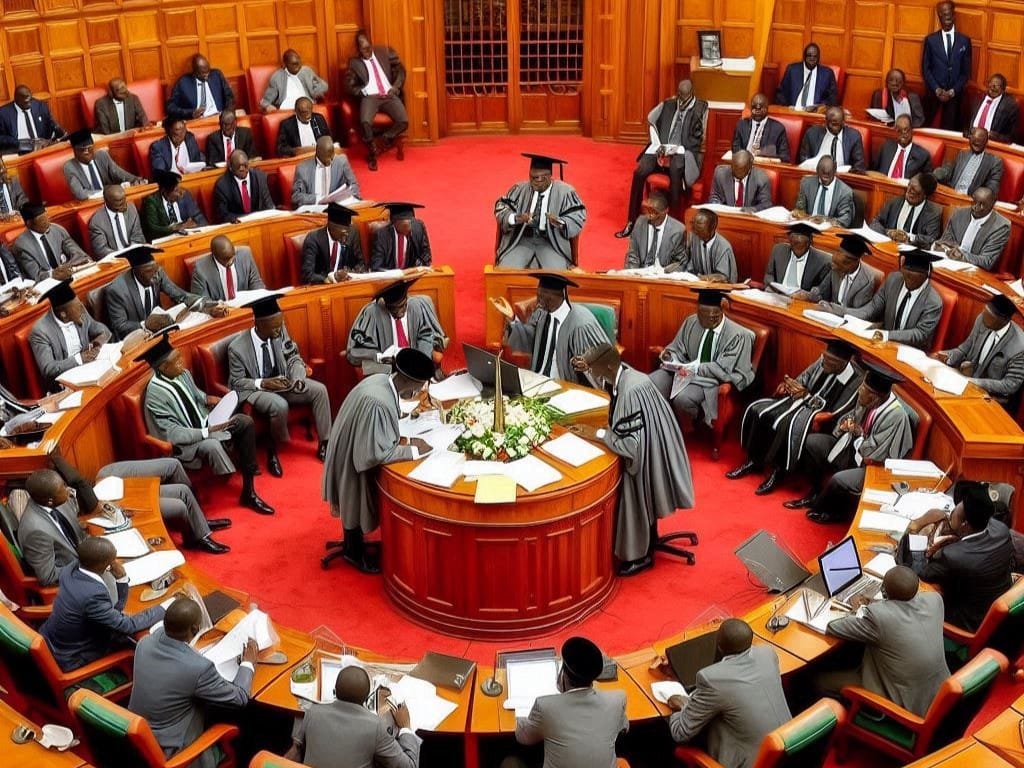Costly mistakes and a big spending plan...for whom?
One problem solved, others opened. The end of a strike was little reprieve as focus remained on higher education. As is recently apparent, there’s a need for a lot of funding, and future plans seem blind to the growing pain from current unresolved challenges. But despite this, there are still developments worth staying optimistic about as the avenues provided by technology continue to be appreciated.
Here are the main stories in Education this week:
- JSS interns call off 3-week strike
- Delayed capitation funds could derail school term
- South Korea to help strengthen VTCs in Kenya
In this edition
SPOTLIGHT: Legislators demand transparency in university fees structure
HEADLINES: Top 3 stories in Education this week
INSIGHT: The future of Kenya's education — a really big plan
PAUSE: The BreakRoom
NEWS: More stories in Education this week
QUICK: Other stories worth a mention
REGION: Top stories across the region in Education
EXTRA: AI for higher education
SPOTLIGHT
Legislators demand transparency in university fees structure

In our last edition, we discussed the contentious New Funding Model, a proposed solution to the debt crisis plaguing public universities. But how did we get here?
Old vs New Model
In the old Differentiated Unit Cost (DUC students) model, the government catered for 80% of the fee while students and institutions covered 20%. Under the new financing model (NFM), students from families with incomes below Kes. 6,000 will receive 95% of government financing, while those with household incomes exceeding Kes. 120,000 will only receive 60% of government support.
According to the Ministry of Education, the government employs a scientific method, Means Testing Instrument (MTI), to assess a learner's ability to pay fees. The method looks at:
- The parent's income and employer
- Medical expenditure
- Primary and secondary school they attended,
- Poverty index
- Motor vehicle ownership etc.
However, the National Assembly Education Committee have argued that the parameters fall short of capturing the true reflection of a student’s background.
Feeling the strain
With the current rollout, students have been called into courses they didn't choose while others have been placed in programs they can't afford. The first batch of first-year students under the NFM have already accumulated substantial fee balances, which are expected to increase as they progress. With the second cohort set to join universities this August and September, many students and parents have signalled their intention to apply for inter-university transfers once the KUCCPS system opens.
A possible long-term outcome of this situation that may not be immediately apparent is thousands of graduates holding credentials they aren’t interested in using. When these graduates join the workforce, what kind of careers will they have ahead of them? The compromises being made here due to poor financial management & resource allocation could cost much more than the perceived savings from this model. More outcomes exist.
HEADLINES
The week's main stories
- JSS interns call off 3-week strike. Following a return to work agreement signed between Junior Secondary School intern teachers and the Kenya Union of Post Primary Education Teachers (KUPPET) leadership in Nairobi on June 1. The 46,000 JSS teachers have been protesting the government’s failure to employ them on permanent terms.
- Delayed capitation funds could derail school term. Schools across the country are raising the alarm over the release of capitation funds a month after the start of second term. “We hope that the funding will come before the midterm break but if we can get the funds sooner that will go a long way in stabilising the situation in schools,” said KEPSHA Chairman, Johnson Nzioka.
- South Korea to help strengthen VTCs in Kenya. Bungoma and South Korea have joined hands to redefine, strengthen and expand Vocational Training Centres through exchange programmes. The programmes will drive innovation, research and job growth for both the County Government and South Korea.
INSIGHT
The future of Kenya's education: a really big plan

“This plan has adopted a bold Vision of ‘An inclusive and equitable quality education, training and research for prosperity.’ This vision underscores our commitment to ensuring that every citizen, regardless of their background or circumstances, has access to quality education that empowers them and contributes to the prosperity of our nation,” -Ezekiel Machogu, Education CS
The Ministry of Education has rolled out its 4th National Education Sector Strategic Plan (NESSP) 2023 – 2027, the first such plan to be drafted under the current government.
According to Cabinet Secretary Ezekiel Machogu, the five-year roadmap spells out policy priorities, programmes and strategies for the education sector over the next five years.
Where it will come from
The ministry will require KES 5.2 trn to implement the plan over the next 5 years.
Two-thirds of KES 3.47 trn will be funded by the government while the remaining KES 1.55 trn will be funded by “…our development partners and household contributions," Machogu said.
Where it will go
The plan cuts across the three state departments covering programmes from pre-primary to university.
Key priorities outlined by NESSP in basic education include: the construction of 16,000 classrooms, employment of 116,000 teachers, retooling teachers on CBC, and providing six million learners with school meals.
Other areas are automation of assessment, curriculum, implementation of the Kenya Education Management Information System (KEMIS), construction/rehabilitation of Teacher Training Centres (TTC) and establishment of Education Assessment Resource Centres (EARC). The Ministry also intends to undertake a school census.
Key priorities for TVETs are: to increase access to TVET by construction and equipping of TVET institutions in constituencies, recruit 2,000 technical trainers & instructors, automation & skills development (digital labs), establish incubation centres in every TVET institution, and implement competency-based education & training (CBET).
Key priorities for universities & research are: to expand the Open University of Kenya, Implementation of New Higher Education Financing Model, develop and roll out Tertiary CBET in Universities, strengthen University-Industry linkages and provide additional research funding.
Overall, this plan shows great promise and intent. However, the disparity between this plan and the current funding challenges being experienced in the country demonstrates a disconnect between intent and action. The Ministry of Education will be held to account for this plan based on the outcomes as plans are only made worthwhile through execution.
PAUSE

NEWS
What else we learned
- The University of Nairobi (UoN) has moved into the top 1,000 universities in the world in the QS World University Rankings 2025. UoN’s improved ranking this year is a result of gains in key categories including employment outcomes, academic reputation, international research & faculty-student ratio. MIT, Imperial College London & University of Oxford were the top 3.
- The inaugural 2024 Mastercard Foundation EdTech Conference themed ‘Education Technology for Resilient and Inclusive Learning in Africa’ in line with the African Union’s Year of Education will take place next month in Nigeria. The conference will provide a platform for various technology companies in Kenya to showcase the country's innovations in the education sector. Learn more about the conference here.
- "The union is demanding that 114,000 teachers who have stagnated in one grade for over 17 years be promoted in July this year by the Teachers Service Commission (TSC). This is unacceptable," said Kenya National Union of Teachers (KNUT) Secretary General Collins Oyuu. He said that despite the allocation of funds for the promotion of teachers, TCS continues to drag its feet as its employees continue to suffer.
QUICK
One-liners
- Kuppet wants more tutors hired ahead of 2025 Grade 9 enrollment [The Star]
- Food4Education named among Time Magazine’s 100 Most Influential Companies [Citizen]
- Ubongo Kids Season 6 sets new standards in African edutainment [Tech-ish]
- Court extends orders barring parents of St. Bakhita from paying increased fees [Citizen]
- TVETs a vital link for sustainable development [The Star]
REGION
What's happening next door?
[UG] Danish envoy challenges Gulu University on research and e-Learning [Nile Post]
[UG] Commonwealth program to support 45,000 in ICT launched. The Commonwealth Businesswomen Africa (CBA) Uganda Chapter has launched a 5-year program to support the sensitization of girls in ICT solutions through coding. According to UNESCO, women make up only 28% of STEM graduates globally. [New Vision]
[TZ] MPs lay emphasis on inclusive education [Daily News]
[TZ] What does Sh128 billion digital learning initiative mean to Tanzanian learners? PM Kassim Majaliwa launched a 5-year initiative dubbed Airtel SmartWASOMI to accelerate digital learning in public secondary schools saying that digital learning is the fastest way to improve learning outcomes & equip children. The initiative targets the most vulnerable children in over 3,000 secondary schools across Tanzania. [The Citizen]
[RW] Kagame awarded honorary doctorate by top Korean university [New Times]
[RW] 84% youth with vocational training get jobs – survey. Rwanda TVET Board (RTB) has said that up to 84% of youth who have enrolled in short vocational courses since 2017 got jobs within the first nine months of graduation.[New Times]
EXTRA
AI for higher education
OpenAI has announced ChatGPT Edu, a version of ChatGPT built for universities to responsibly deploy AI to students, faculty, researchers, and campus operations. Powered by GPT-4o, ChatGPT Edu can reason across text and vision and use advanced tools such as data analysis. Learn how campuses are using ChatGPT today here and also see the short video below for a quick application you can try today for any subject.
We end today's edition with a profound quote:
“If we teach today as we taught yesterday, we rob our children of tomorrow.” – John Dewey
As the futures of many youth hang in the balance between immediate pressure to select courses their families can afford versus what the government can, it waits to be seen where the pin shall drop.
We hope you enjoyed this edition and thank you for your continued feedback and support.
